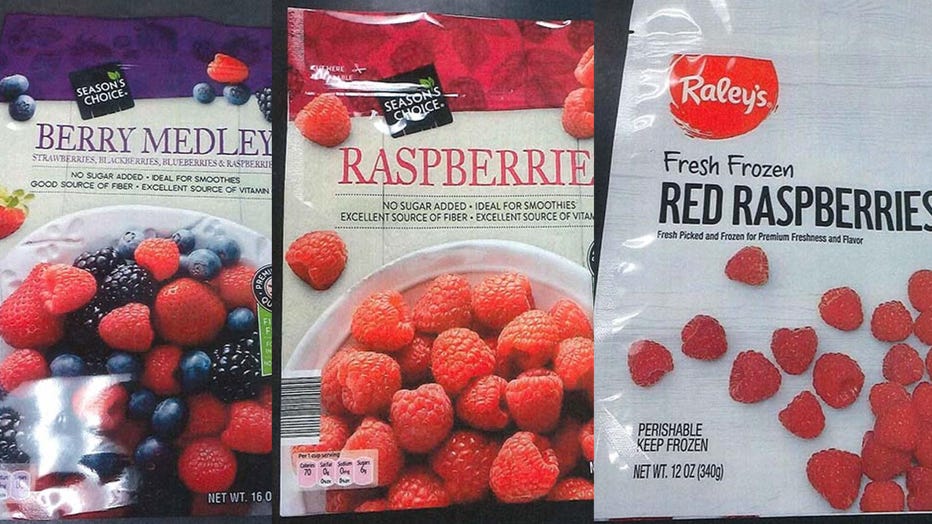Frozen raspberries, mixed berries recalled due to possible hepatitis A contamination
WASHINGTON - Packages of frozen raspberries and mixed berries containing raspberries that are sold at two grocery chains are being recalled because they could be contaminated with hepatitis A, according to the U.S. Food and Drug Administration.
Wawona Frozen Foods issued the voluntary recall for packages of frozen raspberries and frozen berry mixes containing raspberries sold at ALDI grocery stores and Raley’s Family of Fine Stores under the stores’ private labels, officials said.

The frozen packaged products in the recall are shown in provided file images. (Photo Credit: U.S. Food and Drug Administration)
The recalled frozen raspberries were imported from Chile. The recall was issued “out of an abundance of caution” after government sampling resulted in a positive test for hepatitis A.
No illnesses associated with the recall have been reported, the FDA said.
The recalled frozen raspberries were packaged and sold in the following sizes and with the accompanying information:
Sold at ALDI stores —
- Season's Choice Raspberries (frozen): 12 ounce bags, "best by" date of June 10, 2021, August 1, 2021 and August 23, 2021. "Product of Chile." UPC Code: 0 41498 12419 9
- Season's Choice Berry Medley (frozen) containing raspberries: 16 ounce bags, "best by" date of July 17, 2021, July 20, 2021 and July 22, 2021. "Product of USA, Chile." UPC Code: 0 41498 31344 9
Sold at Raley’s Family of Fine Stores —
- Raley's Fresh Frozen Red Raspberries: 12 ounce bags, "best by" date of June 5, 2021 (lot code:20156A04), August 1, 2021 (lot code: 20213A06) "Product of Chile." UPC Code: 46567 00754
Officials said anyone who may have purchased the products should either throw them away or return them to the store for a full refund. Customers with questions can contact Wawona Frozen Foods at 866-913-0667 or visit its website.
Hepatitis A is a highly contagious liver infection caused by the hepatitis A virus, according to the Centers for Disease Control and Prevention. It can range from a mild illness lasting a few weeks to a severe illness lasting several months. Although rare, it can sometimes lead to death, the CDC said.
Hepatitis A typically spreads when a person unknowingly ingests the virus from objects, food or drinks contaminated by small, undetected amounts of stool from an infected person, the agency states on its website.
This story was reported from Cincinnati.

